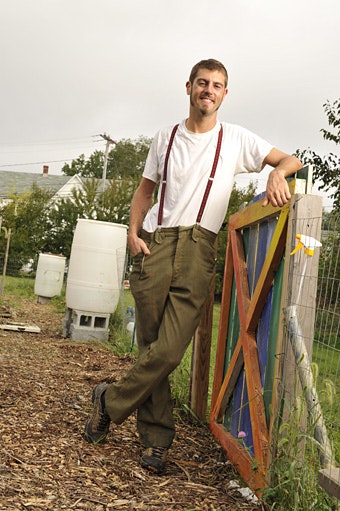Improving Communities Through Urban Agriculture
By Debra Rubino

Some of Jason Reed’s earliest memories involve goats, chickens and cornfields.
“My parents lived on 4-H farms and my grandfather was an avid gardener,” Reed says. “As a kid I loved gardening, but I didn’t realize how much I loved it. When I moved to Baltimore City, I realized I really missed being in my grandfather’s garden.”
So two years ago, when Child First Authority asked him to help take charge of a twice-forgotten community garden in Curtis Bay-Brooklyn, Reed jumped at the chance.
“It’s three-fourths of an acre, near Curtis Bay Elementary/Middle School, and down the street from Benjamin Franklin High School and Bay-Brook Elementary School. Two youth centers and one community center are all within less than eight blocks of the garden,” Reed says. “So it’s a really great location.”
But the Filbert Street Garden needed TLC—and lots of it.
With help from the Curtis Bay Community Association, the Parks & People Foundation, nearby schools and willing community members, Reed transformed the neglected lot from one with beer bottles and hypodermic needles into a vibrant space with raised beds and plots, including perennials, herbs, asparagus and strawberries. There are irrigation towers, a nature path and picnic tables.
“We’re one of the only sheds in the city with mint growing on our roof,” Reed says. “The kids come out in the summertime and make sun tea.”
Reed will use his OSI-Baltimore Community Fellowship to continue his work with the garden and connected projects—which he calls the Curtis Bay-Brooklyn Urban-Agriculture and Stewardship Program (CUSP). The project uses urban agriculture to improve the health of residents and students in that community, foster community pride and increase awareness of the need for land stewardship and good nutrition.
Reed focuses his work on the Filbert Street Garden and neighborhood schools.
“Two years of working in this neighborhood has given us a clear idea of what the role of a community garden can be,” he says. “We partner with residents, local churches and nonprofits to try to get them to take responsibility for one small spot of the garden. That approach makes it totally managed by the community. The community itself becomes actively engaged and actively invested.”
Reed says the Curtis Bay-Brooklyn community is a “food desert.”
“They don’t have a grocery store. There is no produce in the places where most of the residents shop,” he says. “I am planning to develop a method to get the food from the garden out into the community. I envision the garden as a hub for changing the climate in this underserved community. Yet it’s a wonderful place that isn’t treated like it’s wonderful.”
Reed is brainstorming with local churches and schools to keep the garden thriving year-round.
Reed teaches a garden class at Curtis Bay Elementary/Middle School that grows salad greens through the winter and will “sell” its wares to other classes for mock money that can be used to buy incentives, such as Tootsie Rolls or pencils.
And he’s working to get volunteers from churches to host canning workshops.
“One of the big problems is that fresh garden produce is delicious, but it doesn’t stay fresh all that long,” Reed says. “So we’ll teach people how to can, and that food will be donated to the food pantry. And if people bring their mason jars back, they’ll keep getting produce for free.”
Interestingly, Reed’s background is in music, not urban agriculture. He studied at the Peabody Institute, and took a job landscaping after graduation when careers in music proved elusive. But it was the community aspect of gardening that really grabbed him.
“I appreciate the community,” he says. “I really have fallen in love with the idea of sitting out on my porch and having eight other porches next to mine and seeing those other lives, sharing those other lives.
“I’m kind of a meddler when I see something in the community that shouldn’t be,” continues Reed, a self-described nomad. “I have a hard time walking away from it. That’s part of the reason why I’m still here, because I can see there’s still work to be done.”
Until June 2015, Debra Rubino was the director of strategic communications at OSI-Baltimore.